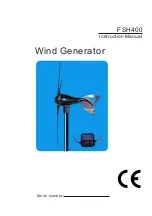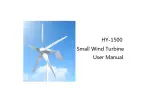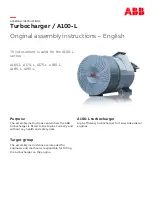
9) Place the nose cone over the center line of the blades assembly and snap the
nose cone into place. Carefully check it is secure by firmly pulling on and be
sure all three edges are catch. Don't worry if the nose cone missing, it will not
affect the performance of the wind generator.
Nose Cone
14
9)
Before attaching the wiring to the battery, make sure that:
a.All
wires
connect to controller ok.
b.The
controller
stop switch is in the “Stop” or shorted position.
c
.
when you connect battery to controller, the LED will light on”00”.
Note: Grounding
For long-term operation and protecting the electronics, properly grounding
is very important. Grounding procedures must be followed along with any
local electrical codes.
The negative wire of your system should be connected to a ground. This is
usually done by connecting a wire from the negative battery terminal to a
nearby ground rod. Wires with the same ratings as the positive and
negative wires must connect all system grounds.
A ground electrode can be made for systems without an existing system
ground from an 8 ft. (2.4 m) section of 3/4" (19 mm) galvanized pipe or
conduit, or an 8 ft. (2.4 m) section of 5/8" (16 mm) iron or steel rod. This
ground electrode must be buried completely beneath the soil, at no more
than 45 degrees from vertical, or horizontally at least 2 1/2 ft. (75 cm)
beneath the surface. It is recommended that the ground electrode be
installed as close as possible to the batteries for maximum lightning
protection. The base of the tower is also a good location for an
appropriate surge arrestor.
Caution: Improper Grounding Will Damage Your Wind Generator
And Void Your Warranty.


















